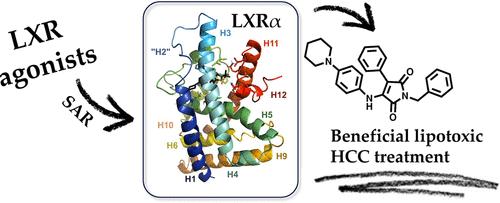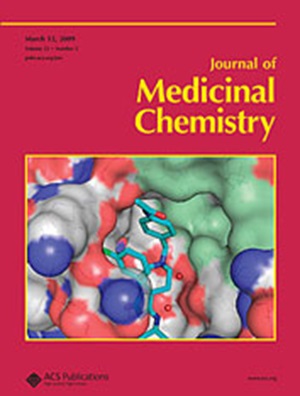揭示肝X受体激动剂在脂毒性癌症治疗中的α-选择性
IF 6.8
1区 医学
Q1 CHEMISTRY, MEDICINAL
引用次数: 0
摘要
肝细胞癌(HCC)是全球最常见的癌症致死原因之一。我们最近发现,药理诱导的脂肪毒性是治疗 HCC 的一种很有前景的治疗策略。合成的 LXRα 激动剂会诱导肿瘤细胞产生有毒的饱和脂肪酸。DFG-out Raf抑制剂通过诱导蛋白酶体降解硬脂酰-CoA去饱和酶(SCD1)来阻断脂肪酸的去饱和,当与DFG-out Raf抑制剂结合使用时,LXRα激活可引发脂肪毒性诱导的癌细胞死亡。然而,由于缺乏临床使用的特异性 LXRα 激动剂,这一治疗策略的临床转化受到了限制。在这里,我们开发出了一系列前景广阔的马来酰亚胺 LXR 激动剂,它们对 LXRα 的效力更强,特异性更高。我们的激动剂先驱者 40 显示出对 LXRα 的高选择性和对 HCC 有机体的强大疗效,因此说明了将这种脂肪毒性治疗策略推向临床应用的巨大潜力。本文章由计算机程序翻译,如有差异,请以英文原文为准。

Uncovering α-Selectivity for Liver X Receptor Agonists for Lipotoxic Cancer Therapies
Hepatocellular carcinoma (HCC) is one of the most frequent causes of cancer-related deaths worldwide. We recently showed that pharmacologically induced lipotoxicity represents a promising therapeutic strategy for the treatment of HCC. Synthetic LXRα agonists induce the production of toxic saturated fatty acids in tumor cells. When combined with DFG-out Raf inhibitors, which block fatty acid desaturation by inducing proteasomal degradation of stearoyl-CoA desaturase (SCD1), LXRα activation can trigger lipotoxicity-induced cancer cell death. However, the clinical translation of this therapeutic strategy is limited by the lack of specific LXRα agonists for clinical use. Here, we have developed a series of promising maleimide LXR agonists with increased potency for LXRα and enhanced specificity. Our agonist frontrunner 40 shows high selectivity for LXRα and strong therapeutic efficacy in HCC organoids, therefore illustrating a strong potential for advancing this lipotoxic treatment strategy to clinical application.
求助全文
通过发布文献求助,成功后即可免费获取论文全文。
去求助
来源期刊

Journal of Medicinal Chemistry
医学-医药化学
CiteScore
4.00
自引率
11.00%
发文量
804
审稿时长
1.9 months
期刊介绍:
The Journal of Medicinal Chemistry is a prestigious biweekly peer-reviewed publication that focuses on the multifaceted field of medicinal chemistry. Since its inception in 1959 as the Journal of Medicinal and Pharmaceutical Chemistry, it has evolved to become a cornerstone in the dissemination of research findings related to the design, synthesis, and development of therapeutic agents.
The Journal of Medicinal Chemistry is recognized for its significant impact in the scientific community, as evidenced by its 2022 impact factor of 7.3. This metric reflects the journal's influence and the importance of its content in shaping the future of drug discovery and development. The journal serves as a vital resource for chemists, pharmacologists, and other researchers interested in the molecular mechanisms of drug action and the optimization of therapeutic compounds.
 求助内容:
求助内容: 应助结果提醒方式:
应助结果提醒方式:


